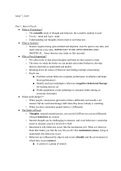Class notes
University of Toronto - PSY100: Intro to Psychology - All Lecture Notes
- Course
- PSY100 (PSY100H1)
- Institution
- University Of Toronto (U Of T )
PSY100: Introduction to psychology / Prof: Paul Whissell / Summer session 2019 Lecture notes
[Show more]



